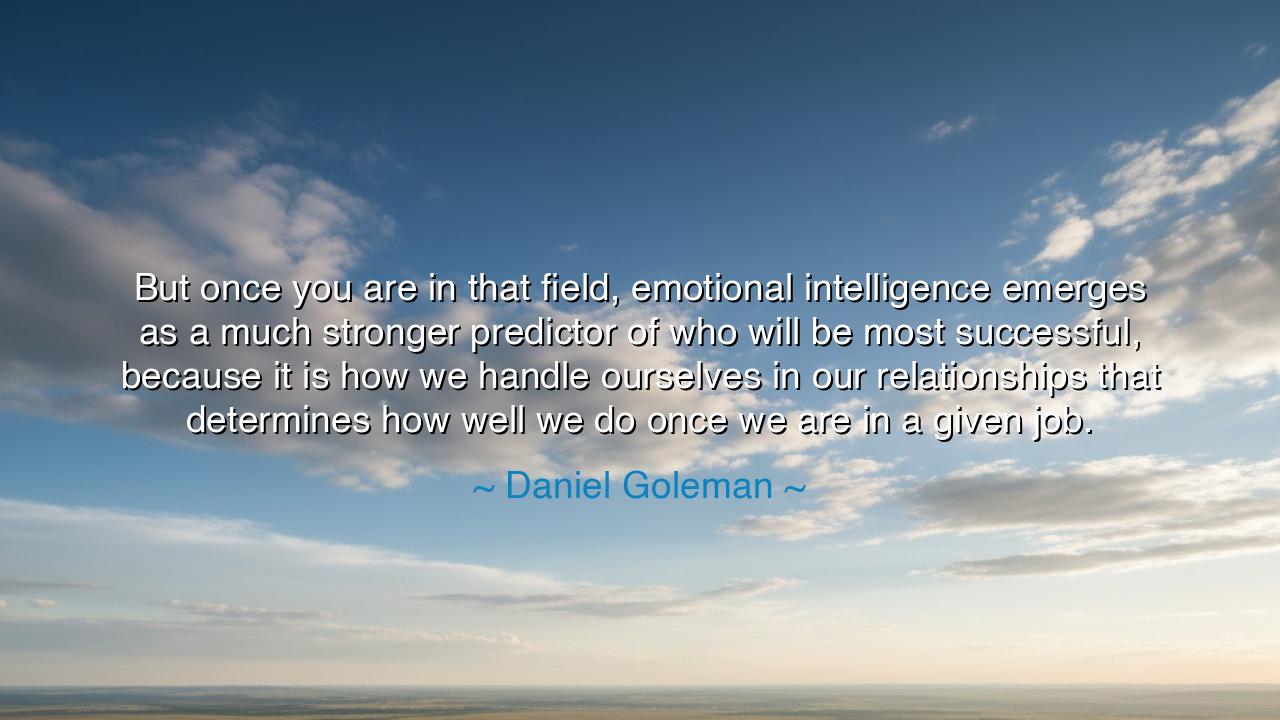
But once you are in that field, emotional intelligence emerges as
But once you are in that field, emotional intelligence emerges as a much stronger predictor of who will be most successful, because it is how we handle ourselves in our relationships that determines how well we do once we are in a given job.






“But once you are in that field, emotional intelligence emerges as a much stronger predictor of who will be most successful, because it is how we handle ourselves in our relationships that determines how well we do once we are in a given job.” – Daniel Goleman
In this reflection, Daniel Goleman, the modern sage of psychology, unveils a truth that pierces through the illusions of intellect and skill: that success is not built solely on knowledge, but on the mastery of the heart. For all the tests of aptitude, for all the measurements of IQ, it is emotional intelligence—the understanding of one’s own emotions and the graceful management of human relationships—that determines the true height of a person’s destiny. Once a man or woman has entered their chosen field, it is no longer the sharpness of the mind that crowns them, but the steadiness of their spirit, the warmth of their empathy, and the harmony of their dealings with others.
The origin of this wisdom lies in Goleman’s lifelong study of human behavior. As a psychologist and author of the seminal book Emotional Intelligence (1995), he sought to answer why the most intelligent people were not always the most successful. He found that in workplaces, in families, in leadership, technical skill opens the door—but emotional maturity keeps it open. He revealed that the most effective leaders were not those who commanded with authority, but those who inspired with understanding. They listened deeply, managed conflict with dignity, and uplifted others through empathy. Thus, he brought to light a principle that the ancients knew but the modern world had forgotten: that the heart must rule in concert with the mind.
This truth is as old as civilization itself. In the courts of ancient China, the philosopher Confucius taught that virtue, not intellect, is the cornerstone of good leadership. In his Analects, he wrote that a ruler who knows himself and governs with compassion brings harmony to all under heaven. Similarly, in the Stoic halls of Rome, Marcus Aurelius declared that mastery of one’s emotions is greater than conquest of nations. For what is the use of brilliance if one is consumed by anger, pride, or envy? What is the worth of knowledge if it cannot build peace between men? The ancients understood what Goleman would later define scientifically: that self-awareness, empathy, and emotional control are the unseen pillars upon which success stands.
Consider, then, the story of Abraham Lincoln, whose greatness lay not merely in intellect but in emotional wisdom. During the turbulence of the American Civil War, Lincoln faced betrayal, mockery, and despair. Yet he governed not through rage but through compassion. He listened even to those who opposed him; he forgave when vengeance was expected; and he carried the pain of his nation with humility. His ability to navigate human emotion—his emotional intelligence—made him not just a leader of men, but a healer of wounds. It was not his knowledge of law, but his understanding of the human heart, that preserved the Union.
In every field, this principle holds. The brilliant engineer who cannot collaborate will be surpassed by one who listens. The doctor who treats disease but neglects the soul will never heal as deeply as one who cares. The teacher who inspires love of learning does more than the one who lectures with facts. For knowledge touches the mind, but empathy transforms the spirit. It is the unseen current beneath every enduring success—the quiet force that binds teams, sustains trust, and turns mere work into purpose.
Yet this wisdom carries a challenge. To cultivate emotional intelligence, one must confront the self. It demands humility—to admit one’s faults; patience—to hear what others feel; and courage—to act with kindness when pride would prefer revenge. It is not an easy path, for the ego resists it. But those who walk it become not only successful, but whole. They lead with grace because they have learned to govern their own storms. They command respect not through fear, but through understanding.
Let this teaching, then, be passed on to all who seek fulfillment: cultivate the intelligence of the heart as earnestly as you train the mind. Learn to listen more than you speak. Strive to understand before you are understood. When anger rises, pause; when pride whispers, remember humility; when you see another’s pain, respond with compassion. For in the end, no title, wealth, or intellect can replace the power of emotional wisdom—that quiet strength by which a person not only succeeds, but truly uplifts the world around them.






AAdministratorAdministrator
Welcome, honored guests. Please leave a comment, we will respond soon